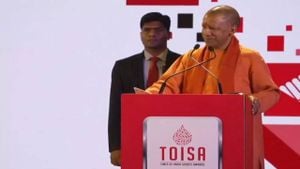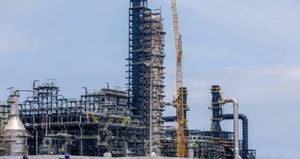The Iranian economy is undergoing significant challenges exacerbated by international sanctions, prompting various reactions from governmental authorities and citizens alike. Recent updates indicate strict limitations on economic activities, which have raised concerns among experts and public figures.
According to reports from ILNA, the Iranian market is feeling the pressure of these measures as inflation continues to rise, affecting the purchasing power of ordinary citizens. The sanctions, primarily imposed by the United States, target key sectors including oil and financial transactions, which are the lifeblood of Iran's economy.
Historical contexts reveal this is not the first time Iran has faced such economic restrictions. Since the 1979 Islamic Revolution, the country has had to navigate through various sanctions intended to curb its nuclear ambitions and influence within the region. These sanctions have taken various forms, including trade embargoes and restrictions on foreign investments.
The Iranian government has responded to the current sanctions by attempting to bolster domestic production and reduce reliance on imports, particularly food and essentials. Officials state these efforts are necessary to sustain the economy. Recent announcements from the Department of Administrative and Employment Affairs indicate operational changes aimed at improving efficiency within government offices.
"It is imperative for us to adapt to the prevailing circumstances and streamline our operations to serve people efficiently," said Ali Mohammad, spokesperson for the Iranian government. Reports released by Reuters highlight how these initiatives, including extending working hours for banks until mid-April, have been implemented to encourage public service and confidence.
Despite these efforts, public sentiment appears contrary to governmental expectations. Many Iranians have expressed frustration over increasing prices and shortages of basic goods. Protests have erupted across various cities, fueled by the deepened economic crisis and limited job opportunities. Activists claim the government's measures are insufficient and do not address the core problems caused by the sanctions.
Mercury, steel, and copper production, higher sources of national revenue, have also seen significant downturns attributed to both sanctions and internal mismanagement. The country’s oil exports, which once represented over 80% of revenue, have dropped to record lows, severely impacting the overall economic sustainability.
Reacting to the situation, the Iranian leadership has attempted to pivot toward alliances with neighboring countries and expand trade partnerships. Source reports from The Washington Post indicated recent trade agreements with various Asian nations, fostering hope for some recovery amid the widespread economic turmoil. Iranian officials remain optimistic, asserting these relationships could help mitigate the effects of sanctions.
"We are committed to finding alternative markets and resources to survive this difficult period," said Reza Pahlavi, Iranian economy minister, during his address to the National Assembly.
International perspectives on Iran’s economic condition have varied, with some analysts arguing the sanctions have disproportionately affected the general populace and are unlikely to bring about the desired change in Iranian policy. Others maintain they are central to constraining Tehran’s nuclear program. These assessments contribute to the complex narrative surrounding Iran’s position within global politics.
Historically, instances of civil unrest driven by economic distress have shown the potential for broader social movements within Iran. Experts caution the regime to pay close attention to these dynamics as discontent grows. Some opposition leaders, both domestic and abroad, are mobilizing resources and support to advocate for change, capitalizing on the economic grievances felt by everyday Iranians.
While the Iranian leadership insists on their strategy for resilience, the long-term sustainability of such measures remains uncertain. Financial analysts predict challenges will exacerbate if international tensions continue without resolution, especially as elections approach.
With elections scheduled soon, policy experts speculate about potential changes on the horizon. Depending on election outcomes, different leaderships could lead either to continued isolation or new roads toward diplomacy.
Against this backdrop, the citizens of Iran look on, driven by the hope for change but burdened by the immediate pressures of economic life. Only time will reveal what path Iran will take amid the current sanctions and how effectively the government can respond to the needs and voices of its people.



